五年级下册英语Unit1重点句子归纳
Unit1Myday(讲义)-人教PEP版英语五年级下册(1)

PEP英语五年级下册Unit 1 知识梳理【单元语音归纳】一、单词:eat breakfast[ˈbrekfəst]吃早餐 a.m上午have···class 上···课p.m 下午play sports 进行体育运动why 为什么exercise[ˈeksəsaɪz]活动;运动。
shop 去买东西;购物do morning exercises做早操work[wɜ:k] 工作eat dinner吃晚饭last [lɑ:st]上一个的;刚过去的clean my room 打扫我的房间sound[saʊnd] 听起来好像go for a walk 散步also[ˈɔ:lsəʊ] 还;也go shopping 去买东西;购物busy[ˈbɪzi] 忙的take学习;上(课)need[ni:d] 需要dancing[ˈdɑ:nsɪŋ] 舞蹈play 戏剧;剧本take a dancing class 上舞蹈课letter[ˈletə(r)] 信when 什么时候live[lɪv] 居住after 在(时间)后island[ˈaɪlənd] 岛start 开始always[ˈɔ:lweɪz] 总是;一直usually[ˈju:ʒuəli] 通常地cave[keɪv] 山洞Spain[speɪn] 西班牙go swimming 去游泳late[leɪt] 晚;迟win[wɪn] 获胜二、词语1. eat breakfast 吃早饭2. have…class 上……课3. play sports 进行体育活动4. exercise活动;运动5. do morning exercises 做早操6. eat dinner 吃晚饭7. clean my room 打扫我的房间8. go for a walk散步9. go shopping 去买东西;购物10. take 学习;上(课)11. dancing 跳舞;舞蹈12. take a dancing class 上舞蹈课13. go swimming去游泳【重点句型再现】1. 询问对方什么时间做某事的句型及答语—When do you finish class in the morning? 你们上午的课几点结束?—We finish class at 1 o’clock. 我们一点钟结束上午的课。
小学五年级下册英语Unit1-6核心句子归纳

Unit1-6核心句子归纳Unit 11. -- When do you get up? 你什么时候起床?-- I often get up at 7 o’clock. 我经常在七点钟起床。
2. -- When do you finish class in the morning?你们上午的课什么时候结束?-- We finish class at 1 o’clock. 我们一点钟课程结束。
3. Classes start at 3 o’clock.三点钟开始上课。
4. -- When do you usually eat dinner in Spain?你在西班牙通常什么时候吃晚饭?-- Usually at 9:30 or 10 o’clock. 通常在九点三十分或十点钟。
5. That’s too late! 那太晚了!6. -- When do you do morning exercises? 你什么时候做早操?-- At 7 o’clock. 在七点钟。
7. -- Why are you shopping today? 今天你为什么购物? -- My mum worked last night. So I’m shopping today. 我妈妈昨晚工作了,所以今天我购物。
8. -- What do you do on the weekend? 你在周末做什么? -- I often watch TV and play ping-pong with my father. 我经常看电视,也常和我爸爸一起打乒乓球。
9. That sounds like a lot of fun. 那听起来好像很有趣。
10. I usually wash my clothes. Sometimes I cook dinner.我通常洗衣服。
有时我做晚饭。
11. You’re so busy! 你真忙!12. I often clean my room on Saturdays!我经常在星期六打扫我的房间!Unit 21. -- Which season do you like best? 你最喜欢哪个季节? -- Autumn. 秋天。
五年级下册英语单词句子全部

五年级下册英语单词句子全部人教版五年级下册英语单词(含音标、词性)Unit 1.- eat breakfast [iːt ˈbrekfəst]:动词短语,吃早饭。
- have…class [hæv … klɑːs]:动词短语,上……课。
- play sports [pleɪ spɔːts]:动词短语,进行体育运动。
- exercise [ˈeksəsaɪz]:名词(n.)锻炼;练习;动词(v.)锻炼。
- do morning exercises [duːˈmɔːnɪŋˈeksəsaɪzɪz]:动词短语,做早操。
- eat dinner [iːt ˈdɪnə(r)]:动词短语,吃晚饭。
- clean my room [kliːn maɪ ruːm]:动词短语,打扫我的房间。
- go for a walk [ɡəʊ fɔː(r) ə wɔːk]:动词短语,散步。
- go shopping [ɡəʊˈʃɒpɪŋ]:动词短语,去买东西;购物。
- take [teɪk]:动词(v.)学习;上(课);拿;取。
- dancing [ˈdɑːnsɪŋ]:名词(n.)跳舞;舞蹈。
- take a dancing class [teɪk əˈdɑːnsɪŋ klɑːs]:动词短语,上舞蹈课。
Unit 2.- spring [sprɪŋ]:名词(n.)春天。
- summer [ˈsʌmə(r)]:名词(n.)夏天。
- autumn [ˈɔːtəm]:名词(n.)秋天。
- winter [ˈwɪntə(r)]:名词(n.)冬天。
- season [ˈsiːzn]:名词(n.)季节。
- picnic [ˈpɪknɪk]:名词(n.)野餐。
- go on a picnic [ɡəʊɒn əˈpɪknɪk]:动词短语,去野餐。
- pick [pɪk]:动词(v.)摘;采集。
- pick apples [pɪk ˈæplz]:动词短语,摘苹果。
Unit1Myday基础知识(讲义)-人教PEP版英语五年级下册

班级: ____________ 姓名:____________五年级下册Unit1 基础知识一.句子“勇士闯两关”要求:读3遍以上后,闯第一关“看问句背答句”,再闯第二关“看答句背问句”问句答句1 When do you finish class ? I finish class at 11:05.At 7:00.2 When do you do morningexercises?3 When does she eat breakfast? She eats breakfast at 7:30.He has an English class at 9:00.4 When does he have an Englishclass?5 When do they play sports? They play sports at 3:00 p.m.I clean my room on the weekend.6 What do you do on theweekend?7 What do you do on Mondays? I take a dancing class on Mondays.He goes shopping on the weekend.8 What does he do on theweekend?9 What does she do on Tuesdays? She goes for a walk on Tuesdays.They play music on the weekend.10 What do they do on theweekend?11 Why are you shopping today? My mum worked last night.12 That sounds like a lot of fun. 听起来很有趣。
二.写出下列英文的中文意思。
做完请自己用红笔对照书本答案批改订正,然后背熟所有单词,至少要背熟5次,相信你可以做得很好哦,加油!吃早饭上...课进行体育运动做早操吃晚饭清洁我的房间去散步去购物上舞蹈课去跑步三.根据问句选出合适的答句,将序号填到前面括号里。
PEP五年级英语下册Unit1-6重点知识小结

Unit 1 This Is My Daydo morning exercises晨练eat breakfast吃早饭have english class上英语课play sports进行体育运动eat dinner吃晚饭when什么时候evening夜晚;晚上get up起床at在……点钟usually通常;一般noon中午climb mountains爬山go shopping购物;买东西play the piano弹钢琴visit grandparents看望祖父母go hiking去远足weekend周末often经常sometimes有时候话题1:日常生活时态:一般现在时1.When do you do morning exercises? 你什么时候做早操?I usually do morning exercises at 8:00. 我经常八点钟做早操。
(I usually get up at 12:00 at noon . 我经常在中午十二点起床。
) 2.When do you eat dinner ? 你什么时候吃晚餐?I eat dinner at 7:00 in the evening. 我在晚上七点种吃晚餐。
3.When is the best time to go to Beijing? Fall. 最好在什么时候去北京?秋天。
Unit 2 My Favourite Seasonspring春天summer夏天fall秋天winter冬天season季节which哪一个best最;极swim游泳fly kites放风筝skate滑冰make a snowman堆雪人plant trees种树why为什么because因为sleep 睡觉话题2:季节时态:一般现在时1.Which season do you like best ? I like spring best.(Spring.)你最喜欢是什么季节?我最喜欢春季。
2020年深圳英语五年级下Unit 1 Tidy up 单元重点知识归纳
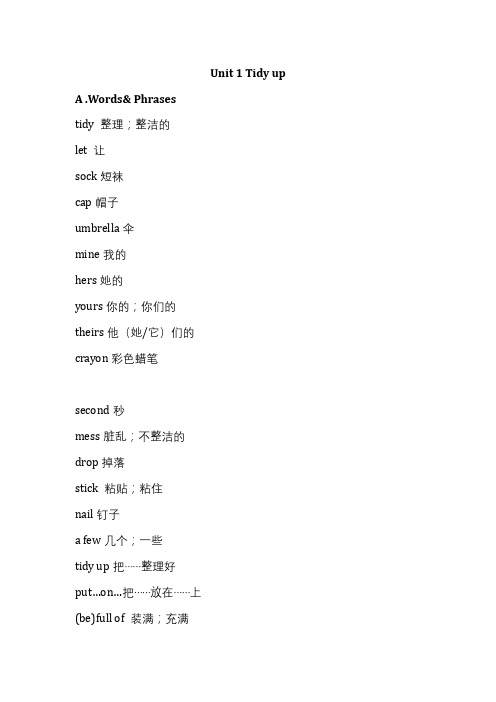
Unit 1 Tidy up A .Words& Phrasestidy 整理;整洁的let 让sock短袜cap帽子umbrella伞mine我的hers她的yours你的;你们的theirs他(她/它)们的crayon彩色蜡笔second秒mess脏乱;不整洁的drop掉落stick 粘贴;粘住nail钉子a few几个;一些tidy up把……整理好p ut…on…把……放在……上(be)full of 装满;充满B. Key Sentences1. ---Are they yours? ---No, they aren’t.---它们是你的吗?---不,它们不是。
2.--- Whose socks are these?--- They’re mine.---这些袜子是谁的?---它们是我的。
C. Language focus1.---Are they yours?---No, they aren’t.yours是名词性物主代词, your是形容词性物主代词。
它们的区别:名词性物主代词相当于一个名词,单独使用,后面不接名词;形容词性物主代词相当于一个形容词,后面要接名词。
两类物主代词的对照表如下:例如:---Are these your books?这些是你的书吗?---No. They are theirs.不,是他们的。
T his is his football. It’s his. 这是他的足球,是他的。
2. They’re Paul’s。
Paul’s是名词所有格形式,表示所属关系,意为“……的”。
其构成形式是: (1)普通单数名词,直接在词尾加“ ’s ”。
如Mary’s book、 the boy’s football(2)以s结尾的复数名词, 在词尾加“ ’ ”。
如 the girls’ dolls.(3)词尾不带s的复数名词,在词尾加“ ’s ”。
如men’s clothes.(4)两人或多人共同拥有的东西,在最后一个名字后面加“ ’s ”。
译林版英语五年级下册 Unit 1Cinderella知识点梳理

译林版英语五年级下册Unit 1Cinderella知识点梳理一、单词三、重要语法1. Why+ be/情态动词/助动词+主语+其他? Because....(1)Why are you so sad? (be动词句)Why is she so sad?Why aren’t you happy?Why isn’t she happy?Why are you here?Why is she ill?(2)Why do you look so sad? (行为动词句)Why does she look so sad?Why don’t you look happy?Why doesn’t she look happy?Why does he get up so late?Why don’t you go to bed early?(3)Why can you go to the party? (情态动词句)为什么你能去聚会?Why can’t you go to the party? 为什么你不能去聚会?2.put on,take off,try on 用法put on the coat=put the coat ontake off the coat=take the coat offtry on the shoe= try the shoe on注意:it, them 必须放中间put it on put them ontake it off take them offtry it on try them on3.have to不得不+动词原形It’s to late. I have to go home now.4.fit合适 It fits The shoes fit me. The pair of gloves doesn’t fit me. The cap doesn’t fit her.5.be动词与助动词do/does的使用当一个句子中没有动词,只有形容词、名词,需要有be 动词。
人教版小学PEP英语五年级下册知识点归纳

人教版小学PEP英语五年级下册知识点归纳PEP五年级英语下册各单元知识点Unit 1 My day一、重点词汇。
五、重点句型。
1、询问别人什么时候做某事的句型及回答。
句型结构:问:When do you+动词短语原形+其他?(你/你们什么时候做某事?)答:I/We(+频度副词)+动词短语原形+at+具体时间(我/我们通常在几点做某事。
)例:问:When do you go to bed?(你什么时候上床睡觉?)答:I go to bed at 9:00p.m (我晚上9点上床睡觉。
)注意:当主语是第三人称单数(he,she,it,单个人名或单数名词)时,助动词do 要变成does,句型结构是:When does+主语(第三人称单数)+动词短语原形+其他?2、询问别人周末做什么的句型及回答。
句型结构:问:What do you do on theweekend?(你周末做什么?)答:I(+频度副词)+动词(短语)+其他。
例:问:What do you do on theweekend?(你周末做什么?)答:I usually read books. (我通常看书。
)注意:当主语是第三人称单数(he,she,it,单个人名或单数名词)时,助动词do 要变成does,句型结构是:What does+主语(第三人称单数)+do+on the weekend?六、四会句子:When do you finish class in the morning ? 你们上午的课到几点结束?We finish class at 1 o’clock . 我们一点钟结束上午的课。
What do you do on the weekend ? 你周末做什么?I often watch TV and play ping-pong with my father . 我经常看电视,也常和我爸爸一起打乒乓球。
七、语音:cl /kl/ clean clock class cleverpl /pl / plate eggplant please play Unit 2 My favourite season三、重点句型1、询问别人天气怎么样的句型及回答。
剑桥(join in)版小学英语五年级下册单元知识梳理总结(全册)
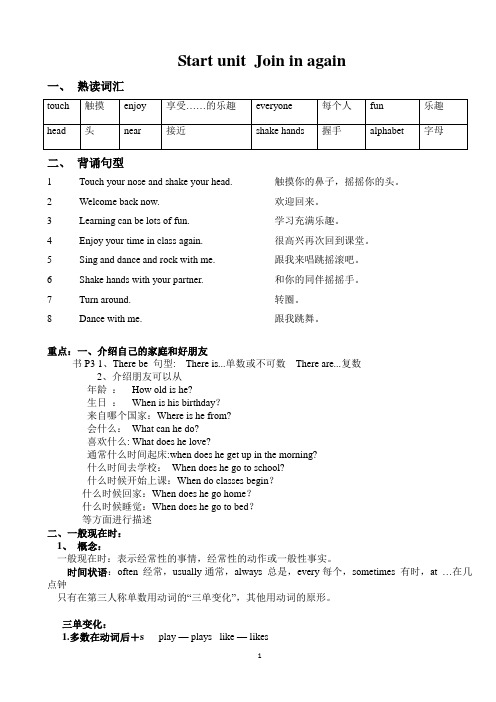
Start unit Join in again一、熟读词汇二、背诵句型1 Touch your nose and shake your head. 触摸你的鼻子,摇摇你的头。
2 Welcome back now. 欢迎回来。
3 Learning can be lots of fun. 学习充满乐趣。
4 Enjoy your time in class again. 很高兴再次回到课堂。
5 Sing and dance and rock with me. 跟我来唱跳摇滚吧。
6 Shake hands with your partner. 和你的同伴摇摇手。
7 Turn around. 转圈。
8 Dance with me. 跟我跳舞。
重点:一、介绍自己的家庭和好朋友书P3 1、There be 句型: There is...单数或不可数There are...复数2、介绍朋友可以从年龄:How old is he?生日:When is his birthday?来自哪个国家:Where is he from?会什么:What can he do?喜欢什么: What does he love?通常什么时间起床:when does he get up in the morning?什么时间去学校:When does he go to school?什么时候开始上课:When do classes begin?什么时候回家:When does he go home?什么时候睡觉:When does he go to bed?等方面进行描述二、一般现在时:1、概念:一般现在时:表示经常性的事情,经常性的动作或一般性事实。
时间状语:often 经常,usually通常,always 总是,every每个,sometimes 有时,at …在几点钟只有在第三人称单数用动词的“三单变化”,其他用动词的原形。
五年级英语下册Unit1cinderella知识点及练习题新版译林

五年级英语下册Unit1 cinderella 知识点及练习题(新版译林)知识点1.Why?Because I can 't gaWhy 为什么回答用Because。
知识点2:clothes 衣服穿上衣服pul 重点单词:重点词组:在王子的家中2 不能去过来帮帮我4 如此的悲伤参加派对6 没有漂亮衣服和鞋子让我来帮你8 穿上新衣服回来10 在12 点之前玩的开心12 在聚会上不得不走14 你的鞋子拜访每一户家庭16 很多女孩试穿鞋子18 它不合适试穿它20 脱下你的外套21 试穿它们22 不得不睡觉23 穿上这件红裙子24 没有翅膀25 帮助灰姑娘26 不得不回来重点句型:王子的家中有一场舞会,但是灰姑娘不能去参加。
2 你为什么这么伤心?因为我不能参加舞会。
3 为什么你不能参加舞会?因为我没有漂亮的衣服和鞋子。
4 灰姑娘穿上了新衣服和鞋子。
她在舞会上玩得很开心。
5 许多女孩试穿了这只鞋,但是不合适。
根据课文内容填空Ta abut Cinderella . Becauvery . A fairy and . Cinderellalothes and . She aat the party. But she go o 'cluns fast andloses( 丢) her . Tany girlbut it . Finally, Cinderella 知识点1:can 的用法1) can 表示能力,意思是“能,会”。
后面直接跟动词原形,用于一切人称和数。
Can 的否定形式为can not ,其缩写为“ can't 。
如:We can speak much English now. 我们现在能说英语了。
2) 表示许可,意思是“可以”。
如:You can watch TV after supper. 晚饭后你可以看电视。
如:You can staax weeks. 你可以再待在这儿六个月。
人教版五年级英语上册各单元以及下册unit1知识点详细归纳(附带练习题)

Un it 1 What 'she like 、单元词汇old年老的polite 有礼貌的clever 聪明的you ng年轻的funny滑稽的kind和蔼的strict严格的hard-working工作努力的helpful愿意帮助的shy害羞的二、单元知识点一般疑问句的改法:①类句子:含有be动词作谓语的句子、或者含有情态动词(will、can、should等)的英语句子,改为疑问句时,把be动词/情态动词提到句首即可!例如:He is very helpful Is he very helpful ?They are hard-working Are they hard-working ?Mike can do kung fu Can Mike do kung fu ?②类句子:含有实义动词作谓语的句子,改为疑问句时,在句首加do/does,主语是第三人称单数时加does,并且谓语动词要去掉三单形式变回原形!例如:I know Mary 宀Do you know Mary ?They play football on the playground ? Do they play football on the playground ?三单形式:当主语是第三人称单数时,后面的实义动词谓语必须是三单形式(一般在实义动词后加s)例如:I read books 宀He reads booksYou play the piano He plays the piano三单形式的句子改为一般疑问句:Does he read books?Does he play the piano ?另外要注意:第一人称和第二人称要互相转换!练习:将下列句子改为一般疑问句:1、I am very helpfull at home _________________________________2、She will come to my birthday party __________________________3、I know ________________________________________________4、He knows _____________________________________________1、Do you know Mr You ng ?这是一个疑问句,陈述句原来是肯定回答:Yes, I do否定回答:No, I don '我的笔I pen (x) my pen (V)I know Mr You ng,②类句子你的尺子you ruler (x) your ruler (V)____ pen 我的钢笔__________ parents 她的父母___________ h ouse 他们的房子3、Is your English teacher strict?原来的陈述句:My English teacher is strict,①类句子,所以改为疑问句只须把be动词提到句首即可,my 变为yourBe 动词+ 人+ 描述体貌特征或性格特点的形容词?意为“某人是 ......... 的吗?”肯定回答:Yes,人+ be动词否定回答:No,人+ be动词not例如:——Is your P.E. teacher funny?——Yes, he is——Are your parents strict ?——No, they aren 't 你的体育老师高吗?是的,她很高你的数学老师年轻吗?不,她不年轻4、如何询问别人某一学科的老师是谁?可以借用特殊疑问词who (谁)的帮助,Who ' s your +学科+ teacher ?意为"你的........ 老师是谁?”回答:Mr/Mrs/Miss + 姓氏例如:——Who is your English teacher ?——Miss Green——Who is your math teacher ?——Mr Ma5、what is he like ?在这句话中, like 不是“喜欢”的意思,而是“像....... 一样”的意思,因为like有两种词性:① 动词,意为“喜欢”,实义动词谓语,不能和be动词同时出现;I like hamburger ;I like apples and grapes② 介词,意为“像……一样”,可以跟在be动词后面作表语;Their child is like him His words are like wisdom询问别人的体貌特征或性格特点的句型:What ' s +某人+ like?,意为询问“某人是像……样的/某人怎么样?” 回答:He' s/She's+ 描述体貌特征或性格特点的形容词.例如:——What is she like?——She is tall and thin——What is your art teacher like ?——He is young and funny6、频率副词sometimes (有时候),usually (通常),often (经常),通常放在主语和动作之间I sometimes read books in the morningI often play football on the playgroundI usually do my homework at 8 o 'clock7、 m ust 是情态动词,情态动词后面跟谓语动词原形(两类谓语)He is tall and strongHe must be tall and strongShe is our new English teacherShe will be our new English teacher 8、 l et me help youLet sb do sth , sb = somebody (某人),sth = something (某事),意为"让某人做某 事”, sb 如果是人称代词,那必须得是宾格形式的Let 'sgo to school = let us go to school Let Mike help you Let him come inUnit 1 单元习题、选出不同类的单词,并将其序号填到题前的括号内。
人教版PEP英语五年级下册Unit1-My-Day知识点归纳与练习(含答案)
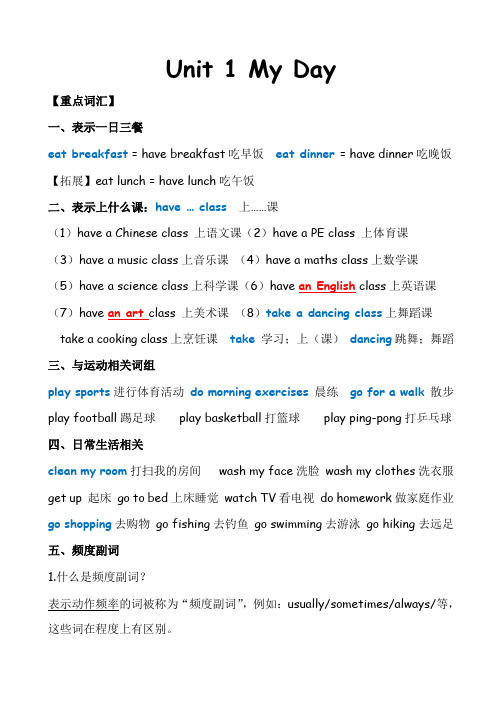
Unit 1 My Day【重点词汇】一、表示一日三餐eat breakfast = have breakfast吃早饭eat dinner= have dinner吃晚饭【拓展】eat lunch = have lunch吃午饭二、表示上什么课:have … class 上……课(1)have a Chinese class 上语文课(2)have a PE class 上体育课(3)have a music class上音乐课(4)have a maths class上数学课(5)have a science class上科学课(6)have an English class上英语课(7)have an art class 上美术课(8)take a dancing class上舞蹈课take a cooking class上烹饪课take学习;上(课)dancing跳舞;舞蹈三、与运动相关词组play sports进行体育活动do morning exercises晨练go for a walk散步play football踢足球play basketball打篮球play ping-pong打乒乓球四、日常生活相关clean my room打扫我的房间wash my face洗脸wash my clothes洗衣服get up 起床go to bed上床睡觉watch TV看电视do homework做家庭作业go shopping去购物go fishing去钓鱼go swimming去游泳go hiking去远足五、频度副词1.什么是频度副词?表示动作频率的词被称为“频度副词”,例如:usually/sometimes/always/等,这些词在程度上有区别。
2.常见频度副词按频率大小排列如下:always(100%)>usually(80%)>often(60%)>sometimes(20%~40%)> never (0%)3.注意频度副词的使用位置:①We usually go to school at seven in the morning.②What do you often do on the weekend?六、常见时间的表达方式1.at + 具体的几点钟;at noon在中午;at night在晚上2.in +月份/季节/早中晚例如:in the morning/afternoon/evening3.关于on表示时间的几种情况:①on + 星期几;②on + 几月几日;③on the weekend在周末;④on Monday morning星期一早上。
五年级下册英语-Unit1 My day知识点总结复习及练习(含答案) 人教PEP

Unit1 My day知识速递1.重点单词和短语eat breakfast: 吃早饭have…class: 上……课play sports: 进行体育运动exercise: /'eksəsaɪz/ 活动;运动do morning exercise: 做早操eat dinner: 吃晚饭clean my room: 打扫我的房间go for a walk: 散步go shopping: 去买东西;购物take: /teɪk/ 学习;上(课)dancing: /'dɑːnsɪŋ/ 跳舞;舞蹈take a dancing class: 上舞蹈课when: /wen/ 什么时候;何时after: /'ɑːftə/ 在(时间)后start: /stɑːt/ 开始usually: /'juʒuəli/ 通常地;惯常地why: /waɪ/ 为什么always: /'ɔːlweɪz/ 总是;一直busy: /'bɪzɪ/ 忙的need: /niːd/ 需要go swimming: 去游泳win: /wɪn/ 获胜2.语法回顾a. 重点单词:eat breakfast, have…class, play sports, exercise, do morning exercise, eat dinner, clean my room, go for a walk, go shopping, take a dancing class, when, usually, why, always, go swimming, win, need.b. 询问何时做某事:When do you……?例:①When do you get up? (你什么时候起床?)②When do you do morning exercises? (你们什么时候做早操?)③When do they go to school? (他们什么时候去上学?)拓展:When does she eat breakfast?练一练:( ) —When______ you do morning exercises?A. doesB. doC. are( ) —When______ she go to bed?A. doesB. doC. arec. 询问他人周末做什么:What do you do on the weekend?例:①What do you do on the weekend? (你周末做什么?)②What does she do on the weekend? (她周末做什么?)回答:①I usually clean my room. (我通常打扫房间。
小学英语五年级下册重点句子汇总
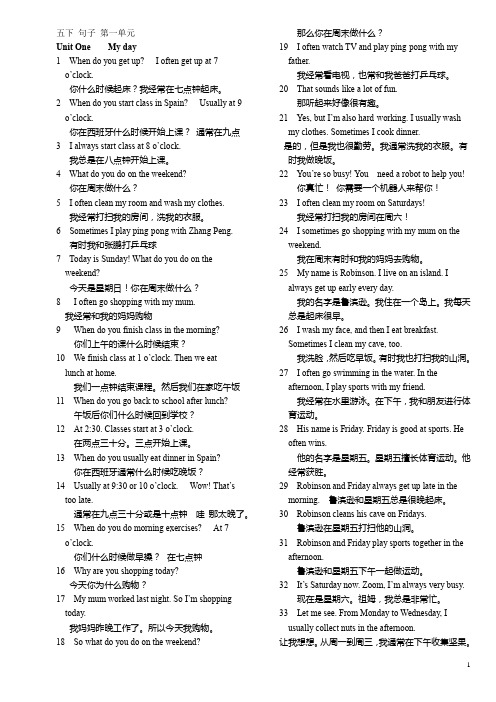
五下句子第一单元Unit One My day1 When do you get up?----I often get up at 7o’clock.你什么时候起床?我经常在七点钟起床。
2 When do you start class in Spain?----Usually at 9 o’clock.你在西班牙什么时候开始上课?通常在九点3 I always start class at 8 o’clock.我总是在八点钟开始上课。
4 What do you do on the weekend?你在周末做什么?5 I often clean my room and wash my clothes.我经常打扫我的房间,洗我的衣服。
6 Sometimes I play ping-pong with Zhang Peng.有时我和张鹏打乒乓球7 Today is Sunday! What do you do on the weekend?今天是星期日!你在周末做什么?8 I often go shopping with my mum.我经常和我的妈妈购物9 When do you finish class in the morning?你们上午的课什么时候结束?10 We finish class at 1 o’clock. Then we eatlunch at home.我们一点钟结束课程。
然后我们在家吃午饭11 When do you go back to school after lunch?午饭后你们什么时候回到学校?12 At 2:30. Classes start at 3 o’clock.在两点三十分。
三点开始上课。
13 When do you usually eat dinner in Spain?你在西班牙通常什么时候吃晚饭?14 Usually at 9:30 or 10 o’clock.----Wow! That’s too late.通常在九点三十分或是十点钟---哇!那太晚了。
2022年人教版PEP小学英语五年级下册unit1至unit3知识点归纳

五年级下册Unit 1-3重点难点、单元单词、短语和知识点知识梳理第一单元知识点一、重要单词:do morning exercises晨练,做早操eat breakfast吃早饭have English class上英语课play sports进行体育活动eat dinner吃晚饭eat lunch吃午饭climb mountains爬山go shopping购物,买东西play the piano弹钢琴visit grandparents看望(外)祖父母go hiking去远足二、重要句子:When do you eat dinner?你什么时候吃晚饭?I eat dinner at 7:00 in the evening.我晚上七点吃晚饭。
When do you get up?你什么时候起床?I usually get up at 12:00 at noon.我一般在中午12点起床。
What do you do on the weekend?你在周末干什么?Usually I watch TV and go shopping.我一般看电视和购物。
Sometimes I visit my grandparents.有时候我去看望我旳外祖父母。
I often play football.我常常踢足球。
Sometimes I go hiking.有时候我去远足。
三、同义词eat breakfast—have breakfast eat lunch—have luncheat dinner—have dinner play sports—do sports usually—often复数形式:policeman—policemen policewoman—policewomen目前分词:tell—telling三单:say—says同义句:What do you do ? ---What are you?你是干什么旳?四、表达频度旳副词:always总是,一直usually一般,常常often常常sometimes有时候五、以复数形式出现旳词组:visit grandparents plant trees介词后跟表达时间旳词语时,表达在某年、某月、某个季节,某个时候(在上午,在下午,在晚上)用in;表达在某一天,在星期几用on,在详细旳几点几分用at.七、too 和either旳使用办法区别:too和either都是“也”旳意思,但too用于肯定句,either用于否认句。
新人教部编版五年级下册英语Unit 1Cinderella单元知识点-译林版
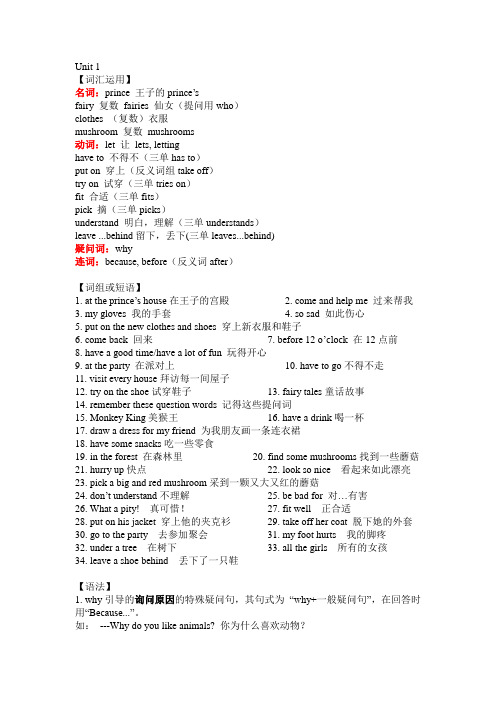
Unit 1【词汇运用】名词:prince 王子的prince’sfairy 复数fairies 仙女(提问用who)clothes (复数)衣服mushroom 复数mushrooms动词:let 让lets, lettinghave to 不得不(三单has to)put on 穿上(反义词组take off)try on 试穿(三单tries on)fit 合适(三单fits)pick 摘(三单picks)understand 明白,理解(三单understands)leave ...behind留下,丢下(三单leaves...behind)疑问词:why连词:because, before(反义词after)【词组或短语】1. at the prince’s house在王子的宫殿2. come and help me 过来帮我3. my gloves 我的手套4. so sad 如此伤心5. put on the new clothes and shoes 穿上新衣服和鞋子6. come back 回来7. before 12 o’clock 在12点前8. have a good time/have a lot of fun 玩得开心9. at the party 在派对上10. have to go不得不走11. visit every house拜访每一间屋子12. try on the shoe试穿鞋子13. fairy tales童话故事14. remember these question words 记得这些提问词15. Monkey King美猴王16. have a drink喝一杯17. draw a dress for my friend 为我朋友画一条连衣裙18. have some snacks吃一些零食19. in the forest 在森林里20. find some mushrooms找到一些蘑菇21. hurry up快点22. look so nice 看起来如此漂亮23. pick a big and red mushroom采到一颗又大又红的蘑菇24. don’t understand不理解25. be bad for 对…有害26. What a pity! 真可惜!27. fit well 正合适28. put on his jacket 穿上他的夹克衫29. take off her coat 脱下她的外套30. go to the party 去参加聚会31. my foot hurts 我的脚疼32. under a tree 在树下33. all the girls 所有的女孩34. leave a shoe behind 丢下了一只鞋【语法】1. why引导的询问原因的特殊疑问句,其句式为“why+一般疑问句”,在回答时用“Because...”。
五年级下册英语重点句子

五年级下册英语重点句子五年级下册英语重点Unit 1 How can we become good learners?•How can we become good learners?•We can become good learners by listening carefully in class.•Taking notes is also an effective way to become a good learner.•Asking questions and participating actively in discussions can help us become good learners.•In addition, reviewing what we have learned regularly is important for improving our learning abilities.Unit 2 What should I do?•What should I do when I feel anxious?•When feeling anxious, I should take deep breaths and try to calm down.•Finding someone to talk to and share my feelings can also be helpful.•I can engage in activities that I enjoy, such as drawing or listening to music, to distract myself from anxiety. •Additionally, writing down my thoughts and feelings in a journal can help me sort out my emotions.Unit 3 A healthy life•What is a healthy diet?• A healthy diet includes a variety of fruits, vegetables, lean proteins, and whole grains.•It is important to drink plenty of water and limit the intake of sugary drinks.•Regular exercise is essential to maintaining a healthy lifestyle.•Getting enough sleep is also crucial for our overall well-being.Unit 4 Seasons and weather•What are the four seasons?•The four seasons are spring, summer, autumn, and winter. •In spring, the weather becomes warmer and flowers start to bloom.•Summer is the hottest season when people often go swimming and have barbecues.•Autumn is characterized by falling leaves and cooler temperatures.•Winter is the coldest season, and it often snows.Unit 5 My past life•What did you do yesterday?•Yesterday, I went to school and had English and math classes.•After school, I played basketball with my friends.•In the evening, I did my homework and watched TV for a while.•Before going to bed, I read a book for half an hour.Unit 6 In the future•What will you do in the future?•In the future, I want to become a doctor and help people. •I hope to travel around the world and experience different cultures.•I plan to continue learning and improving myself.•Besides, I would like to learn to play a musical instrument, like the piano.Unit 7 How do we celebrate festivals?•How do people celebrate Chinese New Year?•During Chinese New Year, people decorate their houses with red lanterns and couplets.•Families gather for a reunion dinner and give each other red packets with money inside.•Fireworks are set off to drive away evil spirits, and lion dances are performed to bring good luck.•People also visit temples to pray for blessings in the coming year.Unit 8 Leisure time•What do you usually do in your leisure time?•In my leisure time, I enjoy reading books or playing games with my friends.•I like to listen to music and sing along. •Sometimes, I go cycling or take a walk in the park.•Watching movies or TV shows is also a common way for me to relax.Unit 9 Our world•What are some endangered animals?•Some endangered animals include the panda, tiger, and rhinoceros.•These animals are at risk of becoming extinct due to habitat loss and illegal hunting.•Efforts are being made to protect them and their habitats.•It is important for us to be aware of the importance of wildlife conservation.Unit 10 Places of interest•What are some famous landmarks in your country?•The Great Wall and the Forbidden City are iconic landmarks in China.•The Terracotta Army in Xi’an is also a famous tourist attraction.•The Panda Base in Chengdu attracts many visitors who want to see pandas up close.•These places offer insights into the history and culture of the country.。
五年级下册英语Unit1重点句子归纳

五年级下册英语Unit1重点句子归纳五年级下册英语Unit1重点句子归纳Unit11、Welcome to our school! 欢迎来到我们学校。
2、We’ll show you around our school. 我们将带你参观我们学校。
3、Do you often come to the library? 你们经常来图书馆吗?4、We often borrow books from the library. 我们经常从图书馆借书。
5、This way ,please. 请这边走。
6、This is our meeting room.这是我们的会议室。
7、Do you often have meetings here? 你们经常在这开会吗?8、We’ll have a meeting in it this afternoon. 我们今天下午将在这里开会。
9、We often have science lessons in it. 我们经常在这里上科学课。
10、How many science lessons do you have in a week? 你们一周有几节科学课?11、We havfe two science lessons in a week。
我们一周有两节科学课。
12、This is our language lab. 这是我们的语音室。
13、How many English lessons do you have in a week? 你们一周有多少节英语课?14、We have three. 我们有三节。
15、Do you like English? 你们喜欢英语吗?16、We all like it. 我们都喜欢它。
17、You speak English very well. 你英语说得非常好。
18、Thank you very much. 非常感谢。
19、How many science lessons do you have in the science lab? 在科学实验室里你们有多少节科学课?20、We have one science lesson in the science lab. 我们在科学实验室里有一节科学课。
五年级下册英语第一单元整理归纳

精品文档五年级(下)Unit 11.单词:run 跑sorry 对不起,不好意思(道歉时用)jump 跳;跳跃sing 唱;演唱dance 跳舞sit 坐down 向下;朝下;沿着stand 站立;直立up 向上;在上面see 看见;明白;会见(过去式为saw)boy 男孩(复数boys)girl(复数girls) 女孩now 现在draw 画picture 图画;图片woman 女人(复数women) talk 交谈;讨论baby 婴儿(复数babies) cry 哭;哭泣;喊叫who 谁sleep 睡觉;入睡man 男人(复数men) hungry 饥饿的water 水tea茶(some tea 一些茶) candy 糖果(some candy一些糖果)train(火车)tree树(复数trees) window 窗户banana香蕉(复数bananas 一根香蕉a banana) dumpling饺子(通常使用的都是其复数形式dumplings)behind 在….之后tired 疲劳的,累的fruit水果(some fruit 一些水果) water 水(some water 一些水)swim游泳happy 高兴的sad 伤心的newspaper报纸paper纸card 卡片,纸牌(复数cards)find 发现,找到2.短语:go straight 直行turn left 左转turn right 右转ride a bike 骑自行车sit down坐下起立stand up站起来look at 看(某人或某物)look out of 从….向外看read the newspaper看报纸read a book /read books看书draw a picture /draw pictures 画画sing a song /sing songs 唱歌play football 踢足球play basketball 打篮球play ping-pong 打乒乓球play cards打扑克(with和…) watch TV看电视do my homework做作业have breakfast吃早餐have lunch吃午餐have dinner 吃晚餐take a picture / take pictures照相fly a kite / fly kites放风筝look out of the window 向窗户外面看wash my face 洗脸wash my hands 洗手make my bed 叠被子,整理床铺句子:3.祈使句:(祈使句是用来表达命令、请求、劝告、警告、禁止等的句子。
- 1、下载文档前请自行甄别文档内容的完整性,平台不提供额外的编辑、内容补充、找答案等附加服务。
- 2、"仅部分预览"的文档,不可在线预览部分如存在完整性等问题,可反馈申请退款(可完整预览的文档不适用该条件!)。
- 3、如文档侵犯您的权益,请联系客服反馈,我们会尽快为您处理(人工客服工作时间:9:00-18:30)。
五年级下册英语Unit1重点句子归纳五年级下册英语Unit1重点句子归纳
Unit1
1、Welur school! 欢迎来到我们学校。
2、We’ll show you around our school. 我们将带你参观我们学校。
3、Do youlibrary? 你们经常来图书馆吗?
4、Wborrow blibrary. 我们经常从图书馆借书。
5、This way ,please. 请这边走。
6、Tug room.这是我们的会议室。
7、Do youavgs here? 你们经常在这开会吗?
8、We’ll have a meetinga我们今天下午将在这里开会。
9、Wavl我们经常在这里上科学课。
10、How malessons do you have in a week? 你们一周有几节科学课?
11、We havfe twla week。
我们一周有两节科学课。
12、Tur language lab. 这是我们的语音室。
13、How many English lessons do you have in a week? 你们一周有多少节英语课?
14、We hav我们有三节。
15、Do you like English? 你们喜欢英语吗?
16、We all l我们都喜欢它。
17、You speak English very well. 你英语说得非常好。
18、Thank you very much. 非常感谢。
19、How malessons do you havlab? 在科学实验室里你们有多少节科学课?
20、We havllab. 我们在科学实验室里有一节科学课。
21、Wdraw and pa我们经常在这画画和绘画。
22、How many art lesson do you have in a week? 你们一周有多少节美术课?
23、Tur music club. 这是我们的音乐俱乐部。
24、Wg and da我们经常在这唱歌跳舞。
25、Do you like music? Yes, I do. / No, I don’t. 你喜欢音乐吗?是的,我喜欢。
/不,我不喜欢。
26、I like singing. 我喜欢唱歌。
27、I like dancing. 我喜欢跳舞。
28、Can you sing and daus? 你能为我们唱歌和跳舞吗?
29、Wdraw pictuur art club. 我们经常在美术俱乐部
画画。
30、Ig hall,the students welvl. 在会议室里,学生
们欢迎参观者们来到他们学校。
